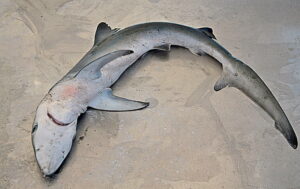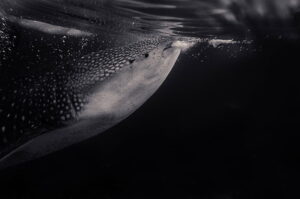Sharks have been inhabiting the planet for over 450 million years. Some are even referred to as apex predators. But, unfortunately, they are still dying and dwindling in number every year.
Sharks are mortal, and they die for various reasons, the most common of which is being hunted. Shark fatalities can be caused by various factors, some of which are natural, while humans cause others. As a result, even though they are at the top of the food chain, these fish are not inherently safe.
We’ll be looking at the various ways sharks die in this post. This will be an informative post through which you will receive knowledge about the subject.
So, without much ado, let us delve deep into the several facts related to sharks’ death.

What is a shark’s life expectancy?
Every biological entity has a different life expectancy- some animals live for a few days while others live for hundreds of years. So, studying shark longevity would be fascinating.
Sharks have a life expectancy of around 20 to 40 years on average. However, due to their feeding and movement patterns, it is difficult for marine specialists to calculate the exact lifespan of sharks. That being said, the lifespan of sharks held in captivity, however, has been found to be as less as nine years.
Here are the life expectancy range of some common shark species:
- Hammerheads: 20- 30 years
- Great Whites: Up to 70 years
- Sand Tigers: 30- 40 years
- Sandbars: 20- 30 years
- Leopards- Up to 30 years
In this context, it’s amazing to learn that the Greenland shark is the world’s longest-living shark. This shark has a lifespan of at least 250 years, but scientists believe it might live for as long as 500 years!
Greenland sharks have a modest growth rate of less than one cm each year. It’s due to their slow rate of expansion, slow metabolism, and ability to withstand the freezing temperatures of ocean waters, allowing them to live a long life.
Will a shark die if they stop swimming?
It’s a fascinating subject to consider whether creatures, such as sharks, die if they cease swimming one day. To learn more, let us explore!
It is not required for all sharks to swim to survive. For example, sharks with a combination of buccal pumping and ram ventilation will not perish if they stop swimming. Sharks without buccal muscles, on the other hand, must constantly move their body to survive.

To avoid drowning and death, some shark species, such as the Mako, Whale, and Great White, must swim with their jaws open even when they are resting. When swimming slowly or resting, sharks like the reef shark can employ their buccal pumping system to keep on pumping oxygen in their bodies.
Do sharks sink when they die?
We are all familiar with that dead things, and creatures float on the water’s surface. We’ve all seen dead fish floating in water bodies. Is it possible to say the same thing about sharks?
When sharks die, their bodies usually sink to the ocean’s bottom. The presence of significant amounts of carbon in their bodies is the cause of this. As a result, when sharks die, their body is deposited in a remote part of the ocean, consumed by scavengers.
However, we have hardly come across a shark carcass at the ocean’s bottom. This is because, within 1- 2 weeks, the body gets shredded by scavengers or decomposition, and the bones will settle in the surrounding sediment. As a result, shark teeth, jaws, and backbones typically transform into fossils, which are examined to learn more about them.
How do most sharks die?

Sharks are the top marine predators, but their numbers are dwindling. As a result, it’s important focusing on some of the most common reasons for shark death.
Every year, it is believed that 100 million sharks die for various reasons. Here are a few of the more common ones:
- Climate change
How could we overlook the role of climate change in shark extinction?
Sharks can’t roam freely because of climate change and an increasingly filthy ocean. Sharks’ foraging and sniffing abilities are also impacted by ocean warming, acidification, and increased garbage dumping. As a result, finding a safe home to live and reproduce in is becoming increasingly difficult for these fishes.
- Natural causes
Nowadays, natural causes are the least common causes of shark death. Nonetheless, these can’t be overlooked. Sharks die from a variety of natural causes, including aging and illness. Bacteria/Virus and worms also target them, causing them to dwindle.
- Predators
Dying because of getting hunted by predators underwater is another reason for sharks’ death. For instance, in the case of bull sharks and great white sharks, being attacked by Orcas is a relatively common occurrence.
Can sharks die outside water?
Like any other living creature, Sharks require oxygen to exist, which they obtain from water. So, if they came out of the water, would they perish?
Of course, a shark would perish outside of the water. However, a shark’s death outside of the water is not only due to a lack of oxygen. They may perish due to the degeneration of their internal organs, in addition to suffocation. Sharks do not have ribs; thus, their organs may be crushed by their weight when they are on land, resulting in their death.
Furthermore, sharks will become exhausted due to their inability to breathe outside water. To struggle for survival, their bodies will release stress hormones to raise blood glucose levels. And, after a long battle, they will plummet to the ocean’s depths and eventually perish.
How do sharks die of natural causes?
Sharks are known to live for long. Their slow growth rate and metabolism work in their favor for getting a longer lifespan. But when the time comes, how do they die naturally?
Sharks can succumb to sickness. Other natural reasons for mortality in sharks include parasite attacks, old age, predator assaults, damage to gills during fighting or due to sickness, harm to fins, and so on.
Do sharks die due to fighting?
Sharks are considered apex predators of the ocean. So, to survive, they need to hunt prey and fight with predators. So, would a shark die fighting with predators?
Sharks have been known to die due to fights. This is especially true when a pod of dolphins or an Orca attacks a shark. In such combat, you can be sure that the shark will perish. While pursuing stingrays, sharks can also get fatally injured by their harmful barbs.
Sharks can also kill each other in a fight. There has been news that two great white sharks attacked one another tore a chunk out of each other in this context. Sharks are commonly said to prey on their own species as a food source in this type of situation.
Do sharks die due to oldage?
One of the natural ways to dwindle is to die of old age. And it would be interesting to analyze if sharks also die due to old age.
Sharks can get old and perish. On the other hand, these fish do not simply grow old and die. They die of old age in the sense that their abilities deteriorate to the point that they fail to participate in the process of survival.
In this regard, it should be noted that, like humans, sharks suffer from a variety of health problems as they age. For example, they suffer joint problems, muscle atrophy, vision and smell problems, and so on. These difficulties may eventually cause them to eat less, hunt less, and fight predators ineffectively, resulting in their death.
Can sharks die due to stress?
Any living entity can be harmed by stress. But, could it be lethal in the case of sharks, causing them to perish?
Experts believe that too much stress can kill some shark species. This is especially true of those mistakenly caught when fishing for other fishes. Even if the sharks are released, the stress induced by the struggle of being caught might prove lethal to them.
Shark sensitivity to angling stress, on the other hand, differs among breeds, according to studies. That being said, some of the most sensitive shark species include blacktip reef sharks and hammerhead sharks.
How do great white sharks die?

One of the most fierce shark species out there is the great white. They prefer open water to roam around and hunt and are known to live as long as humans do (on average).
Great whites have nowadays decreased in number due to death due to captivity and climate change. However, under natural causes of death, the great white sharks are prone to be attacked and killed by killer whales.
How do great white sharks die in captivity?
In open water, great white sharks prefer to roam around freely. So, if they were held captive, would they perish?
Great white sharks have been reported to succumb to death if held in captivity for an extended period. These sharks tend to crash into walls and damage themselves when housed in enclosed spaces. They also cease swimming from time to time, which leads to death by drowning.
How do whale sharks die?

Whale sharks are sharks, not whales. Whale sharks can live for up to 70 years in warm, tropical, or temperate waters.
Larger shark species and blue marlins frequently kill whale sharks in juvenile and old stages. Predators such as killer whales/ orcas and humans also pose threats to whale sharks.
How do hammerhead sharks die?
Hammerhead sharks are an endangered species of shark. This is because they are rapidly becoming extinct in modern times.
The majority of hammerhead sharks perish due to targeted or unintentional fishing. Their highly valued fins, liver oil, and meat make them an accessible target for humans. Hammerhead sharks are also good targets for tiger sharks, great white sharks, and killer whales, in addition to humans.
FAQs:
Q: How do sharks die?
A: Sharks can die in several ways, including natural causes, predation, and human activities such as overfishing.
Q: What is overfishing and how does it affect shark populations?
A: Overfishing is the excessive harvesting of fish species, including sharks, from the ocean. It affects shark populations by depleting their numbers and disrupting the balance of marine ecosystems.
Q: Do sharks die from being out of the water?
A: Yes, most sharks rely on constant movement to pass water over their gills and extract oxygen. If they stop moving or are outside of the water for too long, they may suffocate and die.
Q: Are sharks killed for their fins?
A: Yes, shark finning is a practice where sharks are caught, their fins are cut off, and the rest of the body is discarded. Shark fin soup is a popular delicacy in some cultures, resulting in high demand for shark fins.
Q: How many sharks are killed each year?
A: It is estimated that up to 100 million sharks are killed annually due to overfishing and shark finning.
Q: What is the biggest threat to sharks?
A: The biggest threat to sharks is human activity, particularly overfishing and the demand for shark products.
Q: Do sharks live in the open ocean?
A: Yes, many sharks are open ocean predators and are adapted to live in the vast waters away from the coast.
Q: How do sharks get oxygen from the water?
A: Sharks extract oxygen from the water through their gills, which are specialized organs that filter oxygen and remove carbon dioxide.
Q: Are all sharks large and dangerous?
A: No, sharks come in various sizes and not all of them are dangerous to humans. Some smaller species like nurse sharks are relatively docile.
Q: Are sharks often found near the ocean floor?
A: While some sharks do reside near the ocean floor, many species are capable of swimming at different depths and habitats in the ocean.
Summary
This brings us to the conclusion of the article. We hope you now have a better understanding of the various ways sharks can die. These fish are intriguing, but they are increasingly being killed for causes other than natural. Learning about these causes can help us become more aware of the current state of sharks, and who knows, we also might be able to help save these predators in the future.




